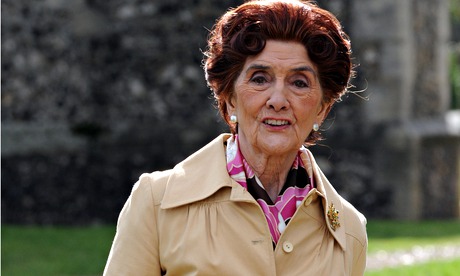
A risk-averse BBC is relying on too few aged shows such as EastEnders, Holby City and Antiques Roadshow to prop up the schedule on its main channel, according to the BBC Trust.
An exercise conducted by the trust revealed that viewers thought BBC1 was guilty of "playing it safe", with too many familiar faces and a peak-time schedule dominated by just 10 programmes.
Worried that the channel is losing young and ethnic minority audiences, a trust review of all four of the BBC's main TV channels published on Thursday singled out BBC1 for criticism, saying Britain's most popular network needed to show "more creative ambition".
Only one of BBC1's peak-time hits – the Saturday night talent show The Voice – is less than five years old, the trust said.
BBC trustee David Liddiment, who led the review, said while there was much to be proud of on the BBC, BBC1 had to take more creative risks.
"This challenge is underlined by the fact in 2013-14 nearly two thirds – 63% – of BBC1's pre-watershed weekday schedule was accounted for by just 10 programmes," said Liddiment, a former ITV director of programmes.
"We're not saying there is anything wrong with these 10 programmes – in pretty much every case they are excellent – but more and more viewing is based around a relatively small number of titles and we would like to see that list lengthening. Potential viewers are not being served by BBC1 in an important time slot."
Other BBC1 programmes that make up the bulk of its peak-time viewing include the weeknight magazine programme The One Show and Sunday night rural affairs show Countryfile.
The trust also warned that viewers thought BBC1 comedy, with the exception of Mrs Brown's Boys, was too middle class, with not enough sitcoms that the family could watch together. Its research also suggested the channel's Saturday offering needed freshening up and lacked the broad appeal of ITV.
Overall the trust report warned that the reach of BBC television – including BBC2, BBC4 and children's channels CBBC and CBeebies – had fallen most among younger audiences and black, Asian and minority ethnic viewers, with total reach slipping to 81% from 84.1% three years ago. The decline was also steeper among lower income than higher income families.
But Pat Younge, the former chief creative officer of the BBC's in-house production department, warned against introducing too many new shows to the heart of BBC1. "If you think about Antiques Roadshow, Countryfile, The One Show, EastEnders – these are big popular shows that the British public loves," he said. "They are the same titles, but it doesn't take into account the amount of refreshing and big narrative arcs that goes on within these shows."
He added: "Lots of new programmes can lead to confusion and audiences not knowing where they are. I don't think [the trust] understands if you took Holby City out of the schedule it would make it much harder to launch a challenging new drama on BBC1 at 9pm."
The report also appeared to question the wisdom of the BBC's decision to axe its youth-orientated TV channel, BBC3, which is due to go online-only next year, saying it was "yet to establish itself as an online destination".
Only BBC3, with an average age of 33, has seen its audience grow younger. The average BBC1 viewer is now 59, up from 56 three years ago, and the typical BBC2 viewer now 60. BBC4 has the most senior audience of all, with an average age of 61.
It said BBC3 was seen by viewers as reflecting diverse Britain – in terms of ethnicity, religion and sexuality – better than any other BBC channel. But it remains to be seen if BBC3 will be reprieved by the trust, in the same way that digital radio station BBC 6 Music was saved in 2010.
Liddiment said it was not part of his remit to examine the BBC3 proposals, which will be the subject of a separate trust report. But he said the BBC's ageing audience, in common with rival channels such as ITV and Channel 4, was an issue that had to be addressed.
"Clearly BBC3 is a channel which is specifically targeted at a younger audience and is quite successful in attracting them," said Liddiment.
"We have not yet received the proposals. We expect them in early autumn, when we will put them to a public value test and assess their impact, particularly on young audiences, and will make a judgment on what we think is in the best interests of licence fee payers."
BBC3 is watched by 26% of 16-to 34-year-olds each week, including 1 million viewers who do not watch any other BBC TV channel. Only 7% of BBC3 viewing is currently via the iPlayer.
A BBC spokesman said: "Like all broadcasters, we acknowledge that more needs to be done to reach underserved audiences, but welcome the recognition that all our channels make strong contributions to the BBC's public purposes and the acknowledgment that they offer some of the very best British drama."
He said that BBC1 would "continue to work on the balance between serving loyal audiences and inviting new and lighter viewers to BBC1 through our creativity, quality and scheduling".

